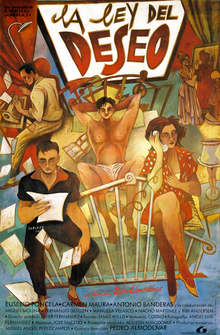| Law of Desire | |
|---|---|
 Theatrical release poster | |
| Spanish | La ley del deseo |
| Directed by | Pedro Almodóvar |
| Written by | Pedro Almodóvar |
| Produced by |
|
| Starring | |
| Cinematography | Ángel Luis Fernández |
| Edited by | José Salcedo |
| Music by | Bernardo Bonezzi |
Production companies |
|
| Distributed by | Lauren Films |
Release date |
|
Running time | 102 minutes |
| Country | Spain |
| Language | Spanish |
| Budget | P100 million |
| Box office | P240.3 million (Spain) |
Law of Desire (Spanish: La ley del deseo) is a 1987 Spanish comedy thriller[1] film written and directed by Pedro Almodóvar. Starring Eusebio Poncela as Pablo, Carmen Maura as Tina and Antonio Banderas as Antonio. It was the first film Almodóvar made independently with his own production company El Deseo.
The story focuses on a complex love triangle between three men. Pablo, a successful gay film director, disappointed in his relationship with his young lover, Juan, concentrates in a new project, a monologue starring his transgender sister, Tina. Antonio, an uptight young man, falls possessively in love with the director, and in his passion would stop at nothing to obtain the object of his desire. The relationship between Pablo and Antonio is at the core of the film; however, the story of Pablo's sister, Tina, plays a strong role in the plot.
Shot in the later part of 1986, Law of Desire was Almodóvar's first work centered on homosexual relationships. He considers Law of Desire the key film in his life and career. It follows the more serious tone set by Almodóvar's previous film, Matador, exploring the unrestrained force of desire. The film's themes include love, loss, gender, family, sexuality, and the close link between life and art.
Law of Desire was met with general positive reactions from film critics, and it was a hit with audiences, becoming Almodóvar's most successful film up to that point. It toured many international film festivals, winning the Teddy Award in Berlin, and it made Almodóvar known internationally.
Elements from Law of Desire grew into the basis for three later films: Carmen Maura appears in a stage production of Jean Cocteau's The Human Voice, which inspired Almodóvar's next film, Women on the Verge of a Nervous Breakdown; Tina's confrontation scene with an abusive priest formed a partial genesis for Bad Education; and a short film version of Cocteau's The Human Voice, starring Tilda Swinton, the first film by Almodóvar to be acted in English.
- ^ Rosewarne, Lauren (2014). Masturbation in Pop Culture: Screen, Society, Self. Lanham, Maryland: Lexington Books. p. 167. ISBN 978-0-7391-8367-0 – via Google Books.